A good year for Grenada
Grenada's housing market grew significantly in 2015, and this positive trend is expected to continue in 2016.
"The past year has been a good one for Grenada. After nearly seven years of contraction and stagnation caused by the global economic collapse we are finally seeing trends of stabilization and signs of growth in the real estate market," according to Paula La Touche-Keller, owner and broker of Century 21 Grenada Grenadines.
In 2015, total sales transactions in Grenada amounted to US$ 40.8 million, an increase of 71% on 2014's transaction value of US$ 23.8 million, according to the Grenada Real Estate Market Report published in January 2016 by Century 21 Grenada Grenadines. On average, there were 40 transactions per month in 2015, similar to the past 3 years - but the average transaction value has surged, increasing by 64% y-o-y to US$ 84,772 in 2015. The report noted that the increase in values was partly due to several luxury villas transactions during the year.
The recovery of Grenada's market is thanks to the US and UK economic recoveries, as most international home buyers in Grenada come from these 2 countries. Although foreign buyers make up only 7% of transactions, their share in terms of value is significant.
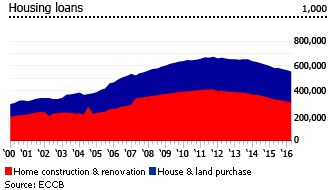
The market's rise was also helped by the Citizenship by Investment (CBI) Program, which allowed several luxury developments to acquire the necessary capital through fractional ownership or sales of company shares. The CBI Program was launched in 2013. In this program, investors who are applying for Grenadian citizenship have two options:
- A donation to the Government of Grenada, National Transformation Fund worth US$ 200,000; and
- An investment in an approved real estate development worth US$ 350,000.
This program has gained significant traction. According to the Century 21 report, the CBI Program is expected to power more real estate developments. Some are anticipated to break ground in 2016, including:
- La Luna Villas - not a CBI-approved project, but houses luxury villas worth US$ 3.5 million to US$ 5 million;
- Joyau des Caraibes (Silver Sands) - A luxury 5 star resort and residences located at the Grand Anse Beach, comprised of 59 rooms, 12 suites, and 9 villas;
- The Pointe at Petite Calivigny - A residential resort and marina containing 4 luxury 2-bedroom villas and 12 condominiums.
Foreigners can buy land in Grenada. Non-nationals must pay Alien Land Holding Tax, at 10% of the property's value, which secures them an Alien Land Holding License.
The spice of the Caribbean
The Spice Island Grenada (pop. 106,000), earned its moniker because of the abundant spice trees in the country. The island breeze is filled with scents of nutmeg, cinnamon, vanilla, and ginger, and produces one-third of the world's supply of nutmeg. Grenada also exports cocoa, bananas, and sugar. Grenada's GDP per capita was around US$8,125 in 2014, according to the IMF.
Grenada is a tri-island nation composed of Grenada, Carriacou, and Petite Martinique. Grenada brims with gorgeous beaches, with both black and sugar-fine white sand. Divers savour elegant coral reefs and the largest shipwreck in the Caribbean, and a breathtaking underwater volcano.
From boom to bust
Following years of political unrest, Grenada's house prices started to rise in the early 1990s and continued to increase substantially during the next two decades. Prices tripled from 1990s to 2009 in prime residential areas on the south shore, especially in Lance aux Epines, True Blue and Westerhall Point.
The country was devastated in September 2004 by Hurricane Ivan, a catastrophic event which damaged 90% of the island's infrastructure and dwellings. However, property prices continued to rise.
The country's property market started to feel the pinch in 2009, when the global economic and financial meltdown flattened residential property prices. In some locations, house prices fell by about 10% annually from 2010 to 2013.
In recent years, the property market has shown signs of recovery, thanks to improving economic conditions. Yet Grenada's house prices are a bargain compared to elsewhere in the Caribbean.
Foreign buyers are boosting the housing market
International airlines now fly directly from major American and European cities. Most foreign buyers interested in the high-end residential market come from Britain, but there is also developing interest from American and Canadian buyers.
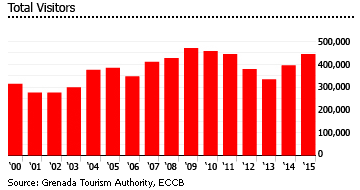
Most foreign homebuyers purchase in the $300,000 to $1 million price range.
In 2015, visitor arrivals rose by 12.5% to 444,391 visitors, according to the East Caribbean Central Bank (ECCB). Stay-over visitors increased by 5.38% to 140,735, mostly from the United States (around 34%), followed by 18% from the United Kingdom, 16% from other Caribbean states, and 8% from Canada.
Visitor arrivals have already surpassed the annual average visitors of almost 443,000 between 2007 to 2011. However, it was still below the 2009 peak of 471,342 visitors.
Positive economic outlook in 2016
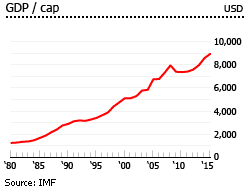
In elections on February 19, 2013, Keith Mitchell's New National Party (NNP - conservative) swept all fifteen parliamentary seats with 59% of the vote, and the moderate opposition party, the National Democratic Congress (NDC - liberal), undermined by the weak economy and internal squabbles, lost all representation, despite winning 41% of the vote.
Many ministers in the previous government had spent their formative years under Maurice Bishop, leader of a socialist revolutionary government from 1979 and 1983 (in 2009 the airport was renamed Maurice Bishop International Airport in his honour). Faced with a stagnant economy after 2009, the NDC government fell apart, in dissention over to whether to stimulate the economy by spending, or pursue economic reform.
The new government is reformist. Prime Minister Mitchell has the distinction of being the only Caribbean politician to sweep all seats on two separate occasions, in 1999 and 2013. Because there is now no opposition in Parliament, Governor General Carlye Glean, the titular head of state, has appointed 3 Senators to the (wholly appointed) Senate, to serve as de facto opposition.
The Grenadian economy expanded by around 4.6% in 2015, backed by the construction sector's rebound, as well as by growth in agriculture and tourism, according to the International Monetary Fund (IMF). This followed much stronger expansion of 5.7% in 2014.
In 2016, the economy is predicted to grow by 3%.
Grenada was once one of the Caribbean's fastest developing economies. Its GDP grew by 7.2% p.a. 1997-2000. But GDP fell by an annual average of 0.7% annually from 2008 to 2013, due to the impact of the global economic and financial crisis. The economy only rebounded in 2014.
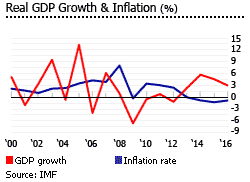
Grenada has a very high national debt, at around 100% of GDP. Unemployment is very high at around 30%, with youth unemployment of over 50%. In 2013 the new government entered selective debt default and agreed restructuring with some creditors at 50c in the dollar. It also entered into a three-year US$21.7 million Extended Credit Facility (ECF) arrangement with the IMF in June 2014.
Grenada's fiscal performance has recently been strong, with a primary fiscal surplus of 2.2% of GDP in 2015. The country's debt-to-GDP ratio declined from 107% in 2013 to 92.7% at end of 2015.
Based on the IMF's recent review, the government met all performance criteria in 2015. "Stronger activity, recent revenue measures, and improvements in tax administration contributed to higher revenue collections, and current expenditure was contained," said the IMF.
"The key priorities in 2016 include execution of the budget in line with program commitments and the new Fiscal Responsibility Act (FRA); focused reforms to ensure prudent and sustainable management of the public sector wage bill; application of the new system to register beneficiaries for social assistance; and follow through on growth-enhancing reforms in the areas of business facilitation and labor legislation," according to the IMF.
Grenada's currency is the East Caribbean dollar (XCD), which has been pegged to the US dollar at 2.7CD since 2001.
Shrinking mortgage market
Grenada's mortgage market has shrunk over the past several years. In 2015, the size of the mortgage market was 22.3% of GDP, down from 32% in 2011, according to the East Caribbean Central Bank (ECCB). Total outstanding housing loans in 2015 was around XCD 572.9 million (US$ 212.8 million), a 6.5% decline from the previous year.
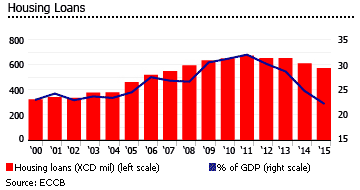
Housing loans are still declining in 2016, and were down 5% during the year to Q2 2016.
In June 2016, the country's prime lending rate remained unchanged at around 6%, according to the ECCB.